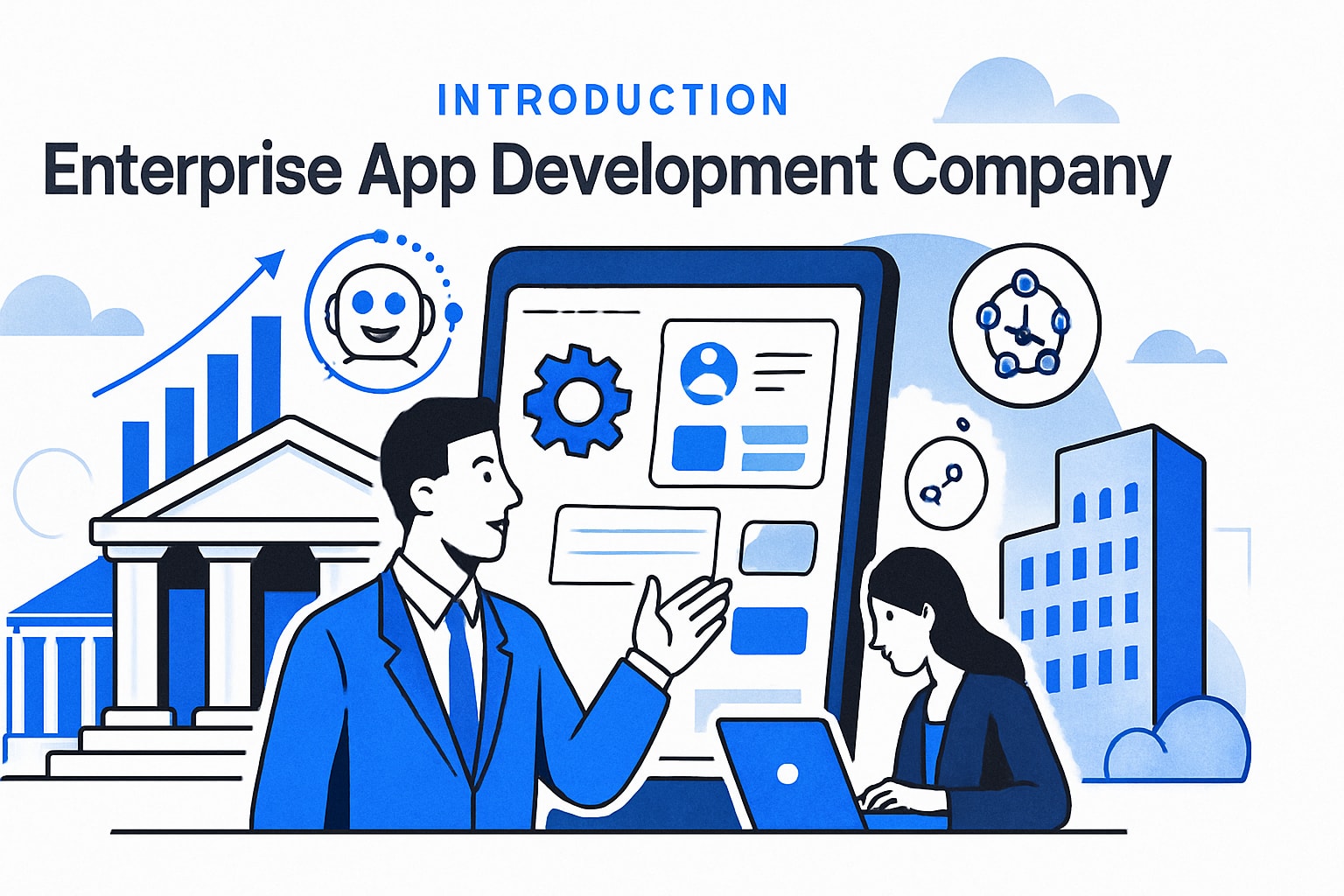The world of enterprise app development is changing at lightning speed. With digital transformation, AI, and no-code tools reshaping business operations, companies face a new sense of urgency to adapt and innovate.
Choosing the right enterprise app development company has never been more critical. The right partner can unlock efficiency, automation, and future growth, while the wrong choice risks falling behind.
This guide pulls back the curtain on the latest trends, must-know insights, and step-by-step strategies for making an informed decision. Ready to future-proof your business? Dive in and discover how to make smarter enterprise app investments for 2025.
Understanding Enterprise App Development in 2025
Enterprise app development is transforming how organizations operate, collaborate, and scale. As digital transformation accelerates, the right enterprise app development company becomes crucial for businesses aiming to keep pace with change.
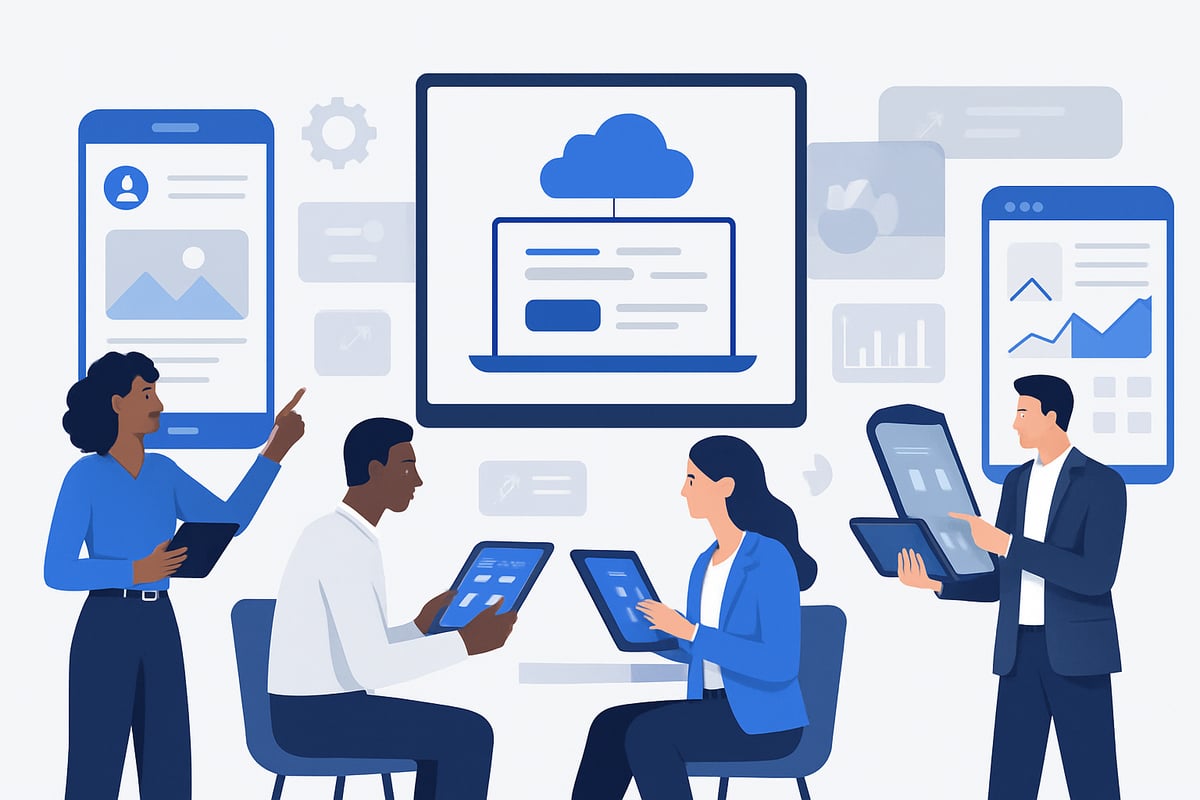
Defining Enterprise App Development
Enterprise app development refers to building complex, scalable software tailored to large organizations. Unlike consumer or SMB apps, enterprise solutions handle massive data, integrate with existing infrastructure, and prioritize security and compliance.
Key goals include:
- Automating repetitive tasks
- Boosting efficiency and scalability
- Protecting sensitive business data
Modern apps are often cross-platform and cloud-native, enabling seamless access across devices and locations. For example, a logistics enterprise app development company might deliver fleet tracking platforms or employee collaboration tools that streamline communication and operations. To explore best practices and challenges in this field, see the Developing Enterprise Applications Guide.
Market Trends & Growth Statistics
The global enterprise app market is booming, with a projected CAGR exceeding 8% through 2025. Organizations are shifting to mobile-first and cloud-based solutions to support remote work and real-time operations.
Industries like healthcare, retail, and finance are leading in adoption, investing in apps that sync data instantly and enable remote teams. Real-time fleet management and digital patient records are just a few examples.
This surge is reshaping IT budgets, with more enterprises partnering with an enterprise app development company to future-proof their digital infrastructure.
Core Benefits for Modern Enterprises
Choosing the right enterprise app development company delivers measurable business gains. Key benefits include:
- Increased productivity via process automation
- Lower operational costs by reducing manual work
- Stronger data security and regulatory compliance
- Enhanced internal communication and customer experience
For instance, a logistics firm improved fleet management with an enterprise app that automated route planning and real-time vehicle tracking. These outcomes highlight why investing in a trusted enterprise app development company is essential for staying competitive.
Key Challenges Facing Enterprises
Despite the advantages, enterprises face serious challenges when launching new apps. Integrating with legacy systems and migrating data can be complex and risky.
Security threats and evolving regulations like GDPR require constant vigilance. Scalability and future-proofing are also critical, as outdated technology stacks can limit growth.
User adoption is another hurdle. Change management and intuitive design are vital, or workflows may become fragmented. Working with an experienced enterprise app development company helps organizations navigate these obstacles and achieve lasting value.
Top Trends Shaping Enterprise App Development in 2025
The enterprise app development company landscape is undergoing a remarkable transformation in 2025. Enterprises are adopting new technologies to drive efficiency, security, and innovation. Let’s break down the six trends shaping the future of enterprise software.
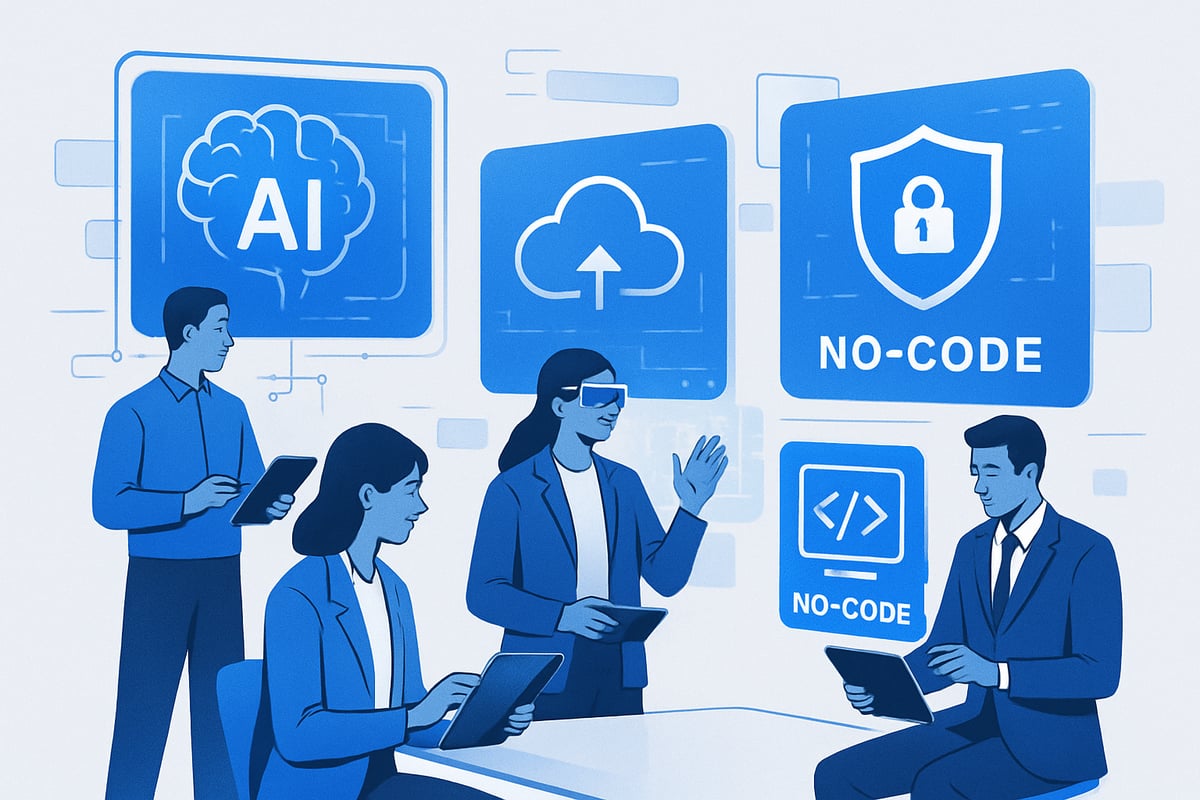
AI & Machine Learning Integration
AI is now a core driver for any competitive enterprise app development company. Businesses use AI-driven automation to streamline operations and enable smarter decision-making. Machine learning models power predictive analytics, providing insights before issues arise.
- AI-powered reporting tools deliver real-time business intelligence.
- Chatbots handle customer queries, freeing up human resources.
- Workflow optimization automates repetitive tasks for efficiency.
Industry reports show a sharp increase in enterprise investment in AI, with more companies leveraging these tools for a competitive edge. As AI becomes standard, companies that ignore this trend risk falling behind.
No-Code and Low-Code Platforms
No-code and low-code platforms are revolutionizing how enterprises build and deploy apps. These solutions empower non-technical staff to create custom workflows and prototypes quickly. The result? Faster time-to-market and reduced reliance on traditional development teams.
- Drag-and-drop interfaces enable rapid prototyping.
- Internal processes can be automated with minimal coding.
- Development costs are slashed, and deployment speeds up.
The surge in no-code adoption is impossible to ignore. For a deeper dive into why enterprises are making this shift, explore No-Code Solutions for Enterprises. This approach lets an enterprise app development company deliver tailored solutions without months of coding.
Cloud-Native & Hybrid App Architectures
Cloud-native and hybrid architectures are now the backbone of modern enterprise applications. By leveraging the cloud, organizations gain scalability, flexibility, and reliable remote access.
- Hybrid apps ensure seamless experiences across devices.
- Integration with AWS, Firebase, and Google Cloud is standard.
- SaaS and PaaS models are increasingly popular for cost efficiency.
A forward-thinking enterprise app development company focuses on building solutions that can grow with business needs. Cloud-native designs make it easy to scale operations and support a distributed workforce, keeping enterprises agile.
Enhanced Security & Compliance Focus
Security remains a top concern for every enterprise app development company. With ever-evolving threats, businesses are prioritizing advanced protocols and compliance.
- Encryption (including SSL and advanced algorithms) protects sensitive data.
- Mobile Device Management (MDM) and OAuth 2.0 control access.
- Adherence to GDPR, HIPAA, and industry standards is non-negotiable.
CIOs consistently rank security breaches among their biggest fears. Secure communication channels and robust data storage practices are essential for trust and compliance. Enterprises must partner with companies that make security a foundational element.
Advanced UI/UX and Employee Experience
Great user experience is the hallmark of a successful enterprise app development company. Intuitive, accessible interfaces drive user adoption and productivity.
- AI-driven personalization tailors the experience to individual roles.
- Streamlined dashboards boost efficiency for busy teams.
- Mobile-first designs cater to the remote and hybrid workforce.
Studies show that thoughtful UX directly impacts employee engagement and business outcomes. Enterprises that invest in UI/UX can expect higher adoption rates and a measurable increase in productivity.
Integration of Emerging Technologies (AR/VR, IoT, Blockchain)
Cutting-edge technologies are unlocking new possibilities for enterprise apps. The best enterprise app development company will harness these tools to deliver next-level solutions.
- AR/VR enables immersive training and real-time support.
- IoT connects devices for instant monitoring and automation.
- Blockchain ensures secure, transparent transactions.
Examples include AR-based field service tools and IoT-enabled asset tracking systems. As these technologies mature, enterprises gain powerful ways to innovate and stay ahead of the competition.
How to Choose the Right Enterprise App Development Company
Selecting the best enterprise app development company is a pivotal decision for any organization aiming to innovate and scale. With so many vendors promising expertise, it’s crucial to use a structured approach to vet potential partners. The right choice can drive your digital transformation and safeguard your investment.
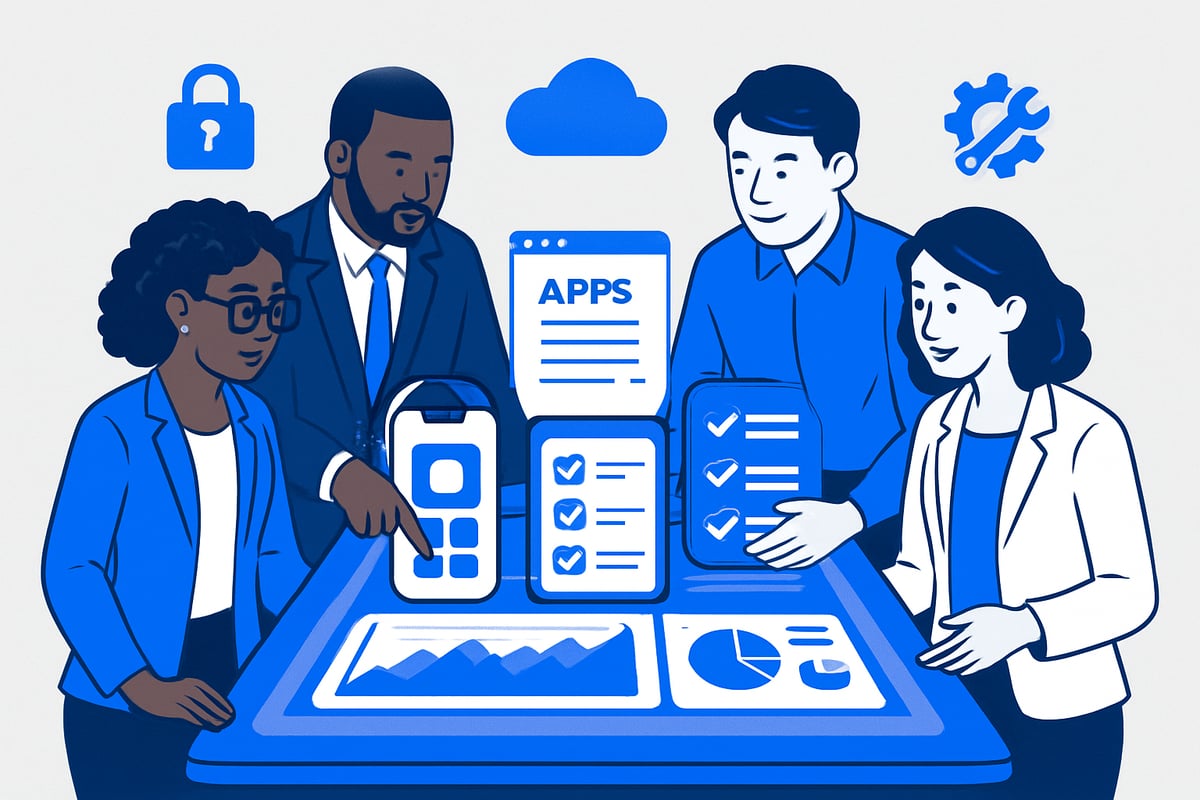
Essential Evaluation Criteria
When evaluating an enterprise app development company, focus on technical expertise across platforms like iOS, Android, web, and cloud. Review the provider’s portfolio for relevant industry experience and proven success stories. Security and compliance capabilities should be demonstrated, especially for regulated sectors.
Scalability is vital; solutions must support your future growth. Examine client testimonials and case studies to gauge reliability. For a comprehensive overview of what a top-tier provider offers, see these Enterprise App Development Services.
Assessing Development Methodologies & Processes
A leading enterprise app development company should embrace agile, DevOps, or other iterative methodologies. These approaches ensure rapid adaptation to changing requirements and transparent communication throughout the project.
Look for vendors who use tools like wireframing, user acceptance testing, and analytics to validate features and track progress. Agile-driven teams can often deliver faster time-to-market and better-quality outcomes.
Customization, Integration, and Maintenance Capabilities
Your enterprise app development company should offer deep customization to match your unique business needs. Assess their ability to integrate with legacy systems and third-party platforms, which is often critical for enterprise environments.
Ongoing maintenance, timely updates, and reliable support distinguish top partners. Ask about their experience migrating legacy data and maintaining long-term system health for clients.
Cost, Timeline, and ROI Considerations
Transparency in pricing is non-negotiable when choosing an enterprise app development company. Request a clear cost breakdown and a realistic timeline with defined milestones. This helps you manage expectations and avoid hidden expenses.
Consider how the provider measures ROI—look for evidence of productivity improvements, cost reductions, and risk mitigation. A strong case study of a project delivered on time and within budget is a positive indicator.
Questions to Ask Potential Partners
Prepare a checklist of key questions to streamline your selection process:
- What technologies and tools does your enterprise app development company specialize in?
- How do you ensure data security and regulatory compliance?
- Can you share client references and case studies?
- What is your approach to post-launch support and ongoing updates?
These questions help you identify a partner who aligns with your goals and values, ensuring a successful, long-term collaboration.
Step-by-Step Enterprise App Development Process
Navigating the enterprise app development process can seem daunting, but a structured approach ensures your project’s success. Every leading enterprise app development company follows a clear, step-by-step methodology to deliver robust, scalable solutions. Understanding each stage helps you set expectations, foster transparency, and collaborate effectively with your chosen partner.
This section breaks down the process into six essential steps, from discovery through deployment. For each step, we’ll highlight best practices, share real-world examples, and show how an enterprise app development company maximizes value at every phase.
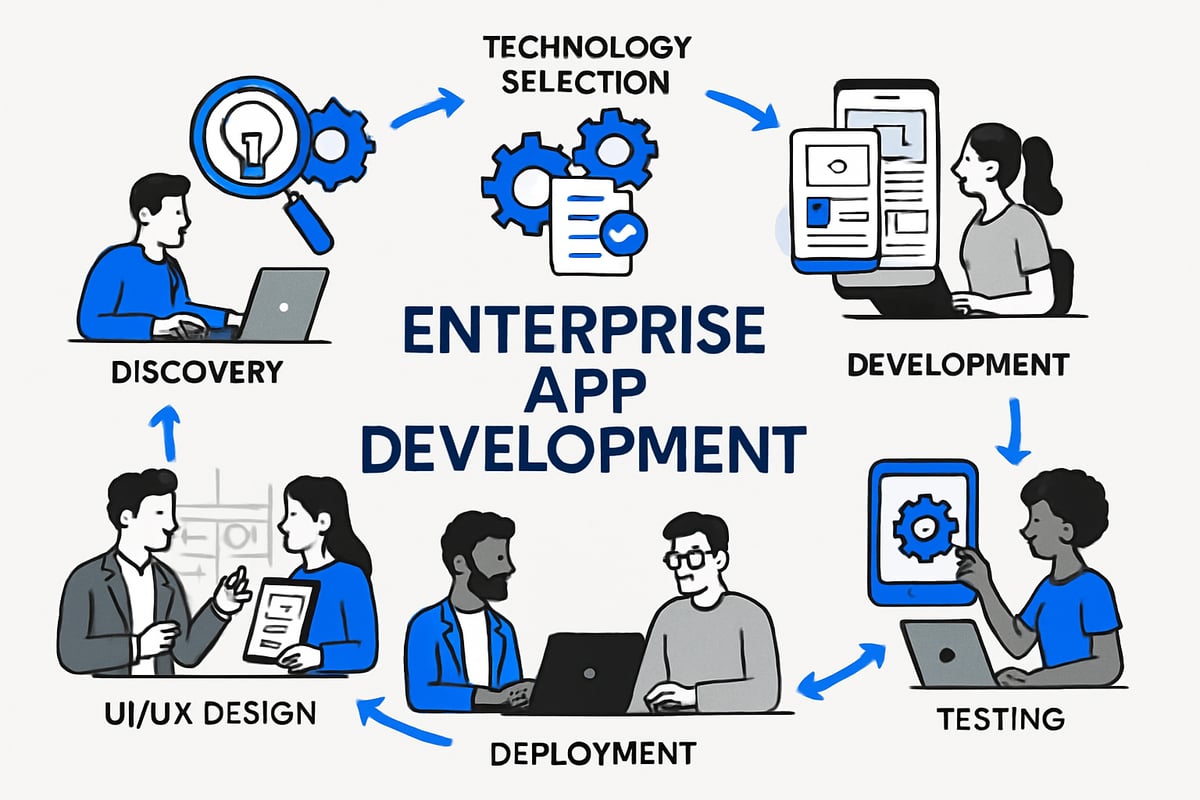
1. Discovery & Requirement Analysis
The journey with an enterprise app development company begins with discovery and requirement analysis. Here, the company collaborates with stakeholders to clearly define business goals and align on project vision. Through interviews and workshops, teams identify workflow bottlenecks, pain points, and must-have features.
A thorough analysis results in detailed documentation of both functional and technical requirements. For example, a logistics provider may prioritize real-time fleet tracking and route optimization. By investing time in this foundational step, an enterprise app development company ensures the project roadmap is clear, achievable, and aligned with business objectives.
2. Technology Selection & Scope Definition
Once needs are defined, the enterprise app development company recommends the best technology stack for your project. Choices may include native, hybrid, or even no-code/low-code platforms, depending on scalability and speed requirements. For organizations seeking rapid results, the Low-Code/No-Code Development Growth trend highlights how these platforms accelerate deployment and lower costs.
Scope definition follows, outlining deliverables, timelines, and integration points—such as connecting your app to cloud platforms or legacy systems. This phase ensures all stakeholders understand the path ahead and agree on key milestones for the enterprise app development company to deliver.
3. UI/UX Design & Prototyping
User experience is a top priority for any enterprise app development company. This stage starts with wireframing the app’s architecture and mapping user flows. Designers create intuitive, accessible interfaces that cater to both technical and non-technical users.
Prototyping tools like Figma help visualize the user journey. Early feedback sessions with stakeholders and end-users allow for iterative refinements. For example, a logistics dashboard prototype might be tested for ease of use by dispatchers before moving to development. A strong focus on UI/UX helps drive adoption and long-term engagement with your enterprise solution.
4. Development & Integration
With designs approved, the enterprise app development company moves into agile development sprints. Modular coding allows for incremental releases and frequent stakeholder feedback. Integration is crucial: the development team connects the app with APIs, third-party services, and existing enterprise systems.
For instance, real-time GPS tracking and cloud data synchronization might be implemented for a logistics app. Continuous collaboration between developers and business leads ensures the final product meets all requirements. By maintaining open communication, the enterprise app development company reduces risks and accelerates delivery.
5. Testing & Quality Assurance
Quality assurance is a multi-layered process for an enterprise app development company. Both manual and automated testing are used to verify app functionality, security, and performance. User acceptance testing (UAT) allows stakeholders to validate that the solution meets business needs in real-world scenarios.
Regression testing ensures new features don’t break existing functionality. For example, before launching a fleet management app, the company will test real-time notifications and cross-device compatibility. Rigorous QA processes help the enterprise app development company deliver reliable, scalable, and compliant solutions.
6. Deployment, Monitoring & Maintenance
The final step for any enterprise app development company is deployment, monitoring, and ongoing maintenance. This can mean publishing to app stores, rolling out via cloud platforms, or distributing internally. Monitoring tools track app health, performance, and user engagement.
Post-launch, the company provides updates, fixes, and user support. For example, a 60-day free maintenance period and continuous health monitoring ensure smooth operation. Regular feedback cycles allow for iterative improvements, keeping your enterprise solution secure, scalable, and aligned with evolving business needs.
Essential Technologies & Tools for Enterprise Apps
Selecting the right technologies is crucial for any enterprise app development company striving to deliver robust, scalable, and high-performing solutions. The tech stack you choose can directly influence app speed, security, and adaptability. Let's break down the essential tools and frameworks that power modern enterprise applications.
Backend, Frontend, and Database Technologies
Every enterprise app development company must carefully select backend, frontend, and database technologies to ensure performance and scalability. Popular backend languages include Node.js, Python, PHP, Java, and Go, each offering unique strengths for enterprise workloads.
On the frontend, frameworks like React, Angular, Vue.js, and Flutter enable responsive, cross-platform interfaces. For databases, MongoDB, MySQL, PostgreSQL, Redis, and Cassandra are top choices, supporting everything from real-time analytics to massive data storage.
| Layer | Popular Choices |
|---|---|
| Backend | Node.js, Python, Java, Go, PHP |
| Frontend | React, Angular, Vue.js, Flutter |
| Database | MongoDB, MySQL, PostgreSQL, Redis |
Choosing the right combination allows an enterprise app development company to build secure, scalable, and efficient solutions.
Cloud Services & Infrastructure
Modern enterprise app development company projects increasingly rely on cloud services for flexibility and scalability. Providers like AWS, Firebase, Google Cloud, and Heroku offer robust hosting, database management, and real-time sync capabilities. Push notification services such as Urban Airship and Pushwoosh enhance user engagement.
The shift toward cloud-native architectures enables rapid scaling, disaster recovery, and seamless remote access. To dive deeper into these advancements, explore Cloud-Native Application Trends for insights on how the cloud is reshaping enterprise app infrastructure.
Implementing these cloud tools ensures an enterprise app development company can support remote teams and evolving business needs.
UI/UX & Prototyping Tools
For any enterprise app development company, delivering a seamless user experience is non-negotiable. Design tools like Figma, Sketch, Photoshop, Illustrator, and InVision allow teams to create wireframes, interactive prototypes, and accessible interfaces.
Prototyping platforms help gather stakeholder feedback early, reducing costly changes later. By leveraging these tools, companies visualize workflows, refine navigation, and ensure accessibility standards are met.
Collaborative design processes not only enhance usability but also boost user adoption rates. Investing in the right UI/UX toolkit positions an enterprise app development company to deliver intuitive, high-impact applications.
App Analytics, Payments & Security
A modern enterprise app development company integrates analytics, secure payments, and robust security measures from day one. Tools like Google Analytics and Flurry provide actionable insights into user behavior and app performance.
For payment processing, platforms such as Stripe, Apple Pay, Google Wallet, and Braintree enable secure, seamless transactions. Security remains paramount, with SSL encryption, OAuth 2.0, and two-factor authentication protecting sensitive data.
By embedding these technologies, an enterprise app development company ensures regulatory compliance, builds user trust, and supports business growth.
Future Outlook: What’s Next for Enterprise App Development?
The future of enterprise app development is brimming with innovation and new challenges. As technology advances, organizations must rethink their strategies to stay ahead. Forward-thinking leaders are already preparing for the next wave of digital transformation, making the right choices now to ensure their enterprise app development company remains competitive.
Predictions for 2025 and Beyond
By 2025, the enterprise app development company landscape will be transformed by automation, AI, and scalable no-code platforms. Business apps will become smarter, with AI-driven analytics and predictive features at their core. According to recent insights, AI Integration in Enterprise Apps is expected to become standard, enabling real-time decision-making and process optimization. The demand for remote collaboration and mobile-first platforms will keep rising, as more enterprises shift to digital workflows. Companies that embrace these trends will gain agility and a competitive edge in their markets.
Evolving User Expectations & Employee Experience
Users and employees now expect personalized, seamless interactions with every enterprise app development company product. The focus is shifting to hyper-personalized experiences, intuitive design, and accessibility for all. Features like employee self-service portals and AI-powered assistants are becoming standard. Enterprises are investing in mobile-first and inclusive platforms to boost engagement. This means that every enterprise app development company must prioritize UX and adaptability, ensuring their solutions meet the evolving needs of a diverse workforce and customer base.
Regulatory, Security, and Ethical Considerations
With stricter data privacy regulations on the horizon, enterprise app development company leaders must build compliance and security into every stage of app design. GDPR, CCPA, and industry-specific rules are shaping how apps handle sensitive information. Ethical AI use and transparent data management are also front and center. This requires robust encryption, consent-driven design, and continuous monitoring. Companies that prioritize these safeguards will earn trust and avoid costly penalties as regulations evolve.
Preparing Your Enterprise for the Next Wave
To thrive in this dynamic environment, organizations should invest in digital skills and flexible IT infrastructure. Partnering with an innovative enterprise app development company can help future-proof business processes. Upskilling teams and embracing continuous learning ensures readiness for emerging technologies. Leaders should explore the Key Differences: Low-Code vs No-Code to choose the right platforms for rapid innovation. By staying agile and open to change, enterprises can navigate the next wave of digital transformation with confidence.
Now that you’ve got a clear picture of where enterprise app development is heading in 2025—AI, no-code platforms, rapid deployment, and future-proof strategies—why not take the next step for your business? If you’re looking to move fast and bring your ideas to life without the usual wait, you don’t have to do it alone. Let’s chat about how you can turn your vision into a working product in record time. Curious about what it’s like to launch with a modern approach? Launch Your MVP in Weeks, Not Months and see what’s possible.




About Big House
Big House is committed to 1) developing robust internal tools for enterprises, and 2) crafting minimum viable products (MVPs) that help startups and entrepreneurs bring their visions to life.
If you'd like to explore how we can build technology for you, get in touch. We'd be excited to discuss what you have in mind.
Other Articles
Discover the 7 best enterprise software development company picks for 2025. Compare features, pricing, and trends to choose the ideal partner for your business.
Discover the future of application technology in 2026 Explore key trends AI integration cloud native architectures and best practices to drive innovation and success
Explore the 2026 success guide for enterprise product development teams Learn strategies team structures and tech to future proof and optimize your teams

